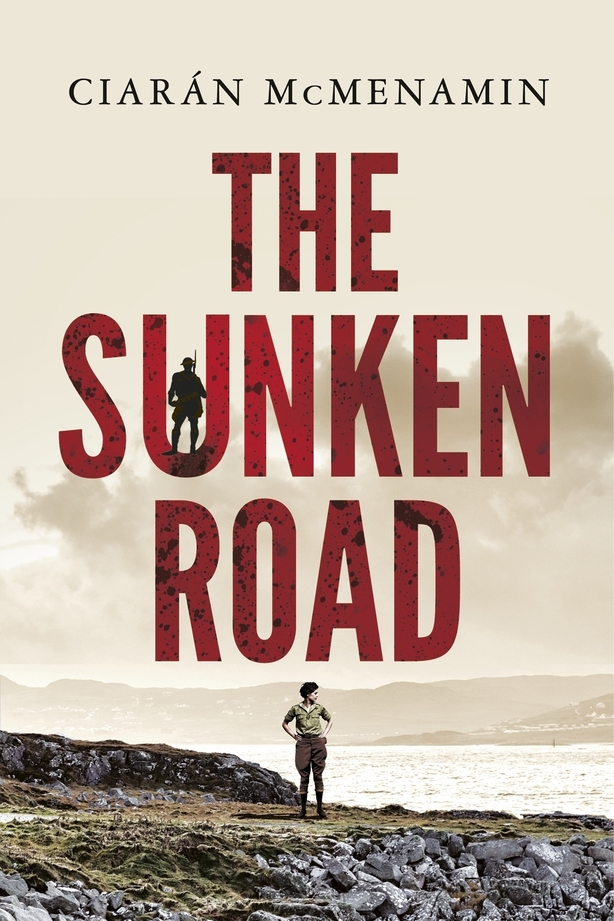We're delighted to present an extract from The Sunken Road, the new novel by Ciaran McMenamin, published by Harvill Secker.
Francie, Archie and Annie grew up playing together in the hills and rivers of Fermanagh. But in 1914, the boys are seduced by the drama of the war in Europe and leave the village to join up. Ciaran McMenamin's accomplished novel explores loyalty, love, heroism and the heartbreaking cost of violence...
The bog slopes gently from both sides and there is cover enough from scrub brush and stacked turf to crawl slowly through its middle towards Hegarty's Public House, whose roof slumps at the bottom of the valley. Away to his right lie the foothills of the Rotten Mountain and off to his left, the expanse of Lough Erne splashes the feet of the British Garrison in Enniskillen at one end and the newly formed border with the Irish Free State at the other.
If he can break through the line that hunts him he can cross the border into County Donegal and join the rest of his column, who have been scattered into the South after skirmishes with Specials in Tyrone. He should have known better than to risk his first visit home in over six years but it had been eating away at him since they were sent north to heat things up along the border so that no one in London forgot that it shouldn’t be there.
At the bottom of the bog, he scales the left-hand hillside at a crouch and looks down over a steep drop on to the pub where he spent too much of his youth. The Crossley tender and the lorry from the bridge are pulled up outside and he can see two sentries keeping an eye on the vehicles. Everyone else is inside, then. Sure it’s never too early for a drink, especially if you’re a soldier or a policeman. The roof of his mouth dries over and he sucks hard on his palate to create a semblance of flow before his throat closes over. Jesus, what would he give for a pint? It’s been six years since he stood down there with a drink in his hand.
When the troops have had their fill, the natives will appear and swill for Ireland under the guise of hearing what all the fuss was about. Charlie Wallace the dairy farmer and Barney Edwards the farrier. Jimmy Donegan the dancing man and Patsy Dolan the eternal drunk. Six years ago they had all champed at the bit to get him packed off to war and now at least one of them had busted a substantial gut to get squealing to the Pigs that the big IRA man was back on home soil. Not even a second night under his mother’s roof before the door came tumbling in. no one is to be trusted since the bile has poured by the bucketful from this newly cut gash of a border.
He pictures the inside of the old place. The tobacco-stained glorification of Waterloo’s bloodbath on the wall inside the door and the crooked Victorian fireplace on the left with the stumpy stools where you could thaw out your shins from the winter. The yellow and black storm clouds in your glass as it thickens and darkens and draws you in for that first sacred mouthful of cream.
He sucks hard on his palate again. He developed the habit under bombardment near Thiepval, wolfing down air and filth and smoke. Begging a God he had always denied for one blessed sip of anything.
The rum ration in the 36th Division was liberal compared to some of the English divisions and many of Ulster’s God-fearing Protestants never touched a drop, so there was plenty to go around for those who needed it. The greatest motivator in the British Empire. Most would never even have gotten over the top without the Royal navy’s finest. It was supplemented by brandy and wine and cheap champagne from the estaminets when they were back in reserve.
He assumed that the drinking would end with the horrors but when he arrived back in Belfast to work in the sectarian crucible of the shipyards, he could barely stay sober at all. 'The Machine’, the other riveters called him, for he worked in silence at speed with barely a break all day. At night he drank himself into the coma required to keep the nightmares from
the backs of his eyes. They knew in the yard that he was Catholic, but they also knew that he had fought well in the trenches with the 36th. They saw the scars on his back and arms and those who worked beside him often caught a glimpse of his dead friends when the sparks from the furnace lit up his eyes.

The Sunken Road by Ciaran McMenamin (published by Harvill Secker) is out now.

